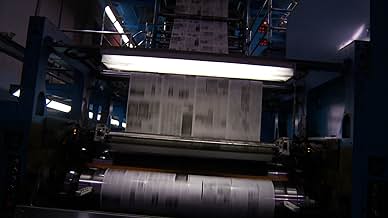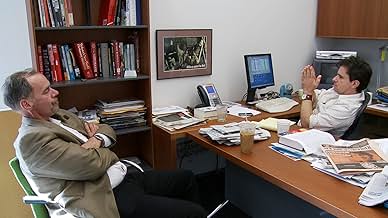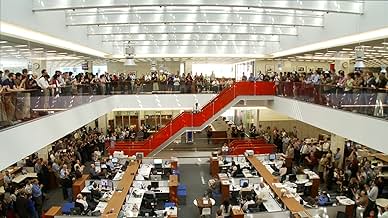अपनी भाषा में प्लॉट जोड़ेंUnprecedented access to the New York Times newsroom yields a complex view of the transformation of a media landscape fraught with both peril and opportunity.Unprecedented access to the New York Times newsroom yields a complex view of the transformation of a media landscape fraught with both peril and opportunity.Unprecedented access to the New York Times newsroom yields a complex view of the transformation of a media landscape fraught with both peril and opportunity.
- पुरस्कार
- 3 जीत और कुल 10 नामांकन
फ़ीचर्ड समीक्षाएं
But the movie's at its best when it's about the newsroom, and this is compelling stuff: decisions being made during the Wikileaks info dump, Iraq withdrawal, and the laying off o a great deal of the paper's workforce. You do get to be a fly on the wall, and during these scenes, it's good stuff.
7/10
Newspapers – and especially the elite newspapers – remain a crucial element in our political culture in that they provide a check against abuse of power by both government and corporations. The internet new media still relies on old media for its reporting and is not equipped to replace it. Clearly new models for cooperation between new and old are needed that will allow mainstream media to continue to profitable. The NY Times is proud, magisterial, occasionally arrogant, and absolutely necessary. Like any old institution, it will survive if it continues to change and evolve for new times and technologies.
Page One is part of an on-going conversation that the United States is having about how media will evolve in the age of the Internet. It is useful film for engaging the broader public in the conversation.
This story is told primarily from the perspective of the staff on the media desk; editor Bruce Headlam, columnist David Carr and correspondent Brian Stelter. These are the guys in the unenviable position of reporting on (amongst other things) the bankruptcy of other newspapers caused by the growth of online news and the drop in advertising and circulation revenues. Carr in particular gets most of the screen time, and deservedly so. He is a profane and fiercely intelligent presence with a back-story worthy of Hollywood itself, while Stelter is that unique case of someone who started out as an anonymous news blogger before moving over to print media. After outing his identity in a series of stories about his site, the Times then went and offered him a job. He is one of the new breed – a journalist who embraces the advantages of developing technology. He is seen at his cubicle with several computers running, tweeting about his stories, even bringing in a brand new iPad to demonstrate to his dumbfounded old-school colleagues.
Rossi spent a year in the Times newsroom and the film covers a variety of stories and issues covered by the paper in that time, including the Iraq War; Carr's piece on the bankruptcy of the Tribune Company (which he linked directly to mismanagement by its new owner Sam Zell and his executives); and the explosion of Wikileaks into the public consciousness with their publication of the Afghan War logs. This last is also compared to the similar case of the infamous Pentagon Papers leak in 1971 by Daniel Ellsberg to the Times. The advances in the internet have essentially done away with the idea of a Deep Throat. No longer will an insider source need to work with a reporter. Now they can just go online and tell their tale to everyone. While this means that "the truth will out" so much more, it also takes away that important middle step of fact-checking, confirming and crafting a story that a properly trained and respected journalist provides.
In its examination of the slowly dwindling print business, this film covers similar territory to the final season of The Wire. David Simon built the conclusion of his opus around a somewhat fictionalised version of his own former haunt, the Baltimore Sun. Simon features in this movie briefly as well, in a short clip of a televised debate on the dying art of a reporter working a beat that also included Arianna Huffington of the all-conquering Huffington Post. He raises a very solid point though: even with everyone and his wife blogging the news from their bedrooms, there will always be a place for the reporter on the scene, notebook in hand. The delivery method may change with the times (pardon the pun) but the infrastructure, methods and ethics of the newspaper will always be necessary. The "more with less" evangelists are having their day in the sun, but hopefully a new day will dawn soon enough. The best way to make sure that happens is to accept the fact that news costs. The film touches on the idea of pay-walls on the online versions of the paper. I'm all for these personally. You have to pay for the physical newspaper, why shouldn't you pay for the digital version?
It's rare that I get to say this, but all the poster quotes are true. This is a fascinating film that covers a lot of ground in only 92 minutes. Now if you'll excuse me, I'm off to buy my online subscription to the New York Times.
The digital revolution , internet, etc have started to compete with printed media such as the legendary newspaper The New York Times, a newspaper that is depicted in this documentary.
We get follow some of their reporters, the job at the editing office, and also the new approach to the internet and surfpads.
But will The New York Times be able to compete with websites like Wikileaks etc?
And how will they survive in climate with ever descending ad incomes?
Will the internet completely destroy investigating journalism?
Because nowadays anyone can be investigating journalist by simply putting their discoveries on a personal blog or any other type of internetbased platform.
These and many other questions are discussed in this highly interesting documentary about media from one of the most prominent newspapers in the world.
The documentary also touches upon the heavy criticisms that newspaper received during the Judith Miller, Jayson Blair scandals and ever growing question, can we trust media at all?
The only flaws I can think of is that sometimes director Andrew Rossi seem to lack focus, not knowing what he wants to tell, he should made the viewers get closer to some of the people working at the New York Times.
I would love to know more about David Carrs background, a colourful journalist, and some of his co workers background.
But this film should been seen by anyone wanting to know more about media, journalism in this riveting documentary. So viewers who liked Outfoxed: Rupert Murdoch's War on Journalism (2004), The Most Dangerous Man in America: Daniel Ellsberg and the Pentagon Papers (2009), Starsuckers (2009) should see this one.
Too bad for the film's audience though, David Carr comes across as more of an a**hole for most of the film and you welcome to other locales and issues the documentary focuses on when it's not on Carr. There are scenes of employee layoffs, contrite apologies about Judith Miller and Jayson Blair, and the continuing defense that without the large, networked mainstream media, these new social media / news aggregator sites would have nothing to link to on their websites. These professional at-home bloggers do not have bureaus in Baghdad, stringers in war zones, and in an amusing side bit, they do not have people following their hometown zoning boards either.
Page One is effective at showing the audience that hardcopy newspapers are not dead yet and they still provide a considerable service to those who wish to remain informed. Regrettably, the film spends way too much time on David Carr and the media section which bogs down the film and makes the audience wait for the next segment not involving Carr.
क्या आपको पता है
- भाव
Shane Smith: I'm a regular guy and I go to these places and I go, "OK, everyone talked to me about cannibalism, right? Everyone talked about cannibalism." Now I'm getting a lot of shit for talking about cannibalism. Whatever. Everyone talked to me about cannibalism! That's fucking crazy! So the actual... our audience goes, 'That's fucking insane, like, that's nuts!' The New York Times, meanwhile, is writing about surfing, and I'm sitting there going like, 'You know what? I'm not going to talk about surfing, I'm going to talk about cannibalism, because that fucks me up.'
David Carr: Just a sec. Time out. Before you ever went there, we've had reporters there reporting on genocide after genocide. Just because you put on a fucking safari helmet and looked at some poop doesn't give you the right to insult what we do. So, continue.
- कनेक्शनFeatured in De wereld draait door: एपिसोड #6.173 (2011)
- साउंडट्रैकLost in Detroit
Written and performed by Rolfe Kent
From the motion picture अप इन द एयर (2009)
Courtesy of Paramount Pictures
टॉप पसंद
विवरण
बॉक्स ऑफ़िस
- US और कनाडा में सकल
- $10,67,028
- US और कनाडा में पहले सप्ताह में कुल कमाई
- $28,911
- 19 जून 2011
- दुनिया भर में सकल
- $10,77,982
- चलने की अवधि1 घंटा 32 मिनट
- रंग
- ध्वनि मिश्रण
इस पेज में योगदान दें































